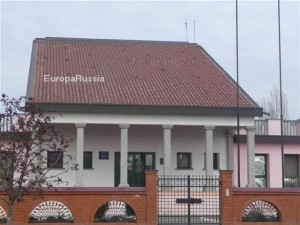Russia
Очередная национальная идея России не работает.
16 Oct 2013«Недавно общался с лесбиянкой из так называемой российской глубинки. Умная, веселая девушка — точнее, еще девочка, ей 13 лет. Пишет стихи…Она любит другую девушку, которой уже 18…Как все влюбленные девочки, мечтает о семье и о детях… недавно сам Президент РФ поставил сторонников однополых браков на место. «Проводится политика, — говорил Владимир Путин о развратном Западе, — ставящая на один уровень многодетную семью и однополое партнерство, веру в Бога и веру в сатану»… Материализм, эгоизм, цинизм, марафонские забеги «налево», нежелание иметь детей — конечно, все эти современные прелести присутствуют и на Западе. Но все-таки смешно, когда представители чемпиона мира по разводам (РФ) объясняют остальным, как строить здоровую семейную жизнь…
Пишет стихи…Она любит другую девушку, которой уже 18…Как все влюбленные девочки, мечтает о семье и о детях… недавно сам Президент РФ поставил сторонников однополых браков на место. «Проводится политика, — говорил Владимир Путин о развратном Западе, — ставящая на один уровень многодетную семью и однополое партнерство, веру в Бога и веру в сатану»… Материализм, эгоизм, цинизм, марафонские забеги «налево», нежелание иметь детей — конечно, все эти современные прелести присутствуют и на Западе. Но все-таки смешно, когда представители чемпиона мира по разводам (РФ) объясняют остальным, как строить здоровую семейную жизнь…
Другие европейские общества пытаются решать свои социальные проблемы «внутри избы». А Россия валит и плохую погоду на секретное сейсмическое оружие недругов (так говорит вице-спикер вашей Госдумы), и обсуждение собственной демографической катастрофы превращает в пафосную пропаганду против секс-меньшинств как «пятой колонны» вечно разлагающегося Запада… »
Статья – – Штефан Шолль – Московский Комсомолец № 26358 от 14 октября 2013 г. Stefan Scholl Moskovskij Komsomolets
Россия. Вставай, страна погромная!
15 Oct 2013Не успеем заметить, как хозяином в городе станет страх. Впрочем, так писать уже поздно, мы уже не заметили.
Страх, на выход. 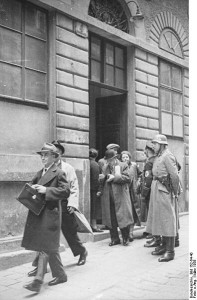
Сайт “спутник и погром”? Прикольно, давайте перепостим?
Давайте. Перепостили.
Лезгинка раздражает? О да!
Запретим лезгинку.
Мешают узбеки?
Конечно. Очень мешают. Но очень помогают набирать голоса на выборах.
Набрали? Отлично.
А теперь, страх — на выход. Встречайте, знакомьтесь, принюхайтесь — нам с ним жить.
Скоро мы выйдем из жан-жаков, джон-доннов, а на Никитском толпа прыгает на голове “чурки”. И из нее кровь.
Зайдем обратно? Еще по кружке?
По кружке, может, успеем, но тихий ужин окончен.
Счет, пожалуйста.
Пришли за “черными” — всё. Значит, и за нами придут. Страх вышел на улицы. Честнее — мы сами выпустили его.
Теперь — сидим, боимся. Нам тоже обязательно пробьют голову и на ней станцуют, просто надо немного подождать. А пока можно еще немного подискутировать о засилье мигрантов и пользе умеренного национализма.
Когда сеешь презрение, ненависть, брезгливость к людям по цвету кожи, разрезу глаз, или если ты хотя бы не против против этого, — другого не жди.
Мы сами встали в строй обвинявших в наших бедах узбеков и кавказцев. И мы все теперь там — в Бирюлеве, в готовой линчевать невинных людей толпе. Виновен, невиновен — неважно, важно одно: чужой..
Это погром. А мы его спутники.
И никакой это не наш город. Страх здесь власть, а не мы.
Blog – Ayder Muzhdabaev – Айдер Муждабаев – Facebook –
CONVEGNO INTERNAZIONALE
Identità italiana: unità nella varietà
15-16 ottobre 2013
Martedí, 15 ottobre
10:00-10:30
10.30-10.45
Apertura dei lavori del Convegno
Saluto del Magnifico Rettore dell’ RGGU Prof. Efim I. Pivovar
Saluto del Direttore dell’Istuto Italiano di Cultura Prof. Adriano dell’Asta
10.45-11.40
Piergabriele Papadia de Bottini, Console della Repubblica Italiana
Identita italiana ed Unita’ d’Italia: riflessioni dal punto di vista storico e linguistico. 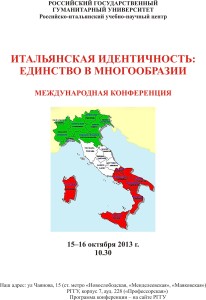
11:40-12:00 – pausa caffè
12:00-14:00
Kirill Kholodkovskij
Variazioni dell’identità italiana nella storia
Irina Semenenko
Demarcazioni socioculturali nell’Italia contemporanea e orientamenti dell’identità politica
Valerij Ljubin
L’identità italiana vista dagli italiani
Mikhail Kabizkij
“La ricerca del popolo italiano” e la demoetnoantropologia
14:00-15:00 – pausa pranzo
15:00-16:25
Mikhail Andreev
L’ultimo classico: Benedetto Croce
Kirill Checalov
L’italiano demoniaco della letteratura popolare dei secoli XVIII e XIX
Natalia Mazur
“Il tuo Buonarroti”, Michelangelo Buonarroti nell’opera di Osip Mandelštam
16:25-16:40 – pausa pranzo
16.40-18.00
Tatiana Bystrova
L’immagine dell’Italia nel romanzo di Giuseppe Genna “Italia de profundis”
Vladimir Smirnov
Dialetto come costante della cultura italiana: lingua e dialetto nell’estetica di Luigi Pirandello
Elena Okhotnikova
Scenografia dell’Unità: il Liberty come primo stile della nuova Italia: mitologia dell’immagine e della ricezione di memoria culturale nella seconda metà del XX secolo
Mercoledí, 16 ottobre
10:30 –12:20
Marina Bakhmatova
Alle origini della formazione dell’identità italiana: Genova, Venezia e Bisanzio nel XIII secolo
Irina Celyševa
L’Italia e la lingua italiana agli occhi dell’Europa medievale
Anna Pozhidaeva
Specificità della formazione di iconogafia dei giorni della Creazione in Italia
Anna Toporova
Topos dell’unità nella letteratura italiana medievale
12:20-12:40 – pausa caffè
12:40-14:10
Tatiana Matasova
L’immagine degli Stati italiani nella Rus’ Moscovita dalla metà del XV secolo ai primi decenni del XVI secolo
Mikhail Šumilin
L’identità nazionale nella “Vertunniana” di Annia da Viterbo, XV secolo
Grigorij Vorobiev
L’immagine italiani nelle opere dell’umanista bizantino Teodoro Gaza
14.10-15.00 – pausa pranzo
15.00-17.00
Liubov Zholudeva
La concettualizzazione linguistica dell’identità italiana nelle opere linguistiche del Cinquecento
Irina Zvereva
Le strategie di traduzione come espressione dell’identità nazionale. Storia delle traduzioni di Shakespeare in Italia
Ksenia Mitokhina
La singolare esperienza delle colonie italiane in Crimea: passato e presente
Olga Gurevich
“Perché siamo italiani?” riflessioni di emarginati (diari e lettere di ebre italiani 1938-1945)
Chiusura dei lavori del Convegno
Миграция, Риск хрустальной ночи в России.
8 Oct 2013Уважаемые оппозиционные политики и общественные деятели, в том числе Алексей Навальный как лидер, недавно облеченный доверием сотен тысяч москвичей! Обращаюсь к вам с просьбой, не личной, а общественно важной. 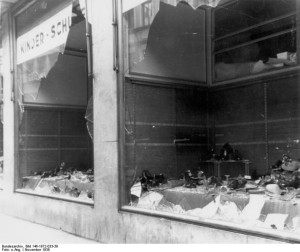
Как гражданин Российской Федерации я обеспокоен происходящим в столице моей Родины и жду от вас коллективного заявления с жестким требованием к власти — о недопустимости “народных зачисток“, “антимигрантских рейдов” и любых постыдных и опасных “акций” на националистической почве.
Скатыванию России к хрустальной ночи и третьему рейху надо сопротивляться, и кто возглавит это сопротивление, если не вы? Уверен, многие москвичи и другие жители страны вас поддержат, поскольку хотят свободно и счастливо жить в европейской стране, а не прозябать в фашистском задворке мира.
Националистический угар в Москве стремительно переходит рамки разумного, перерастает в психоз и провокации, дальнейшее развитие событий непредсказуемо, и это важно остановить именно сейчас.
С уважением и надеждой на вашу любовь к России, дальновидность и разум.
Blog – Ayder Muzhdabaev – Айдер Муждабаев – Facebook –
Russia’s Energy Dominance in Danger.
6 Oct 2013“The U.S. is overtaking Russia as the world’s largest producer of oil and natural gas, a startling shift that is reshaping markets and eroding the clout of traditional energy-rich nations. 
A Wall Street Journal analysis of global data shows that the U.S. is on track to pass Russia as the world’s largest producer of oil and gas combined this year—if it hasn’t already…
The U.S. produced the equivalent of about 22 million barrels a day of oil, natural gas and related fuels in July, according to figures from the EIA and the International Energy Agency. Neither agency has data for Russia’s gas output this year, but Moscow’s forecast for 2013 oil-and-gas production works out to about 21.8 million barrels a day.
U.S. imports of natural gas and crude oil have fallen 32% and 15%, respectively, in the past five years, narrowing the U.S. trade deficit…
The U.S. last year tapped more natural gas than Russia for the first time since 1982, according to data from the International Energy Agency…
The U.S. is also catching up in the race to pump crude. Russia produced an average of 10.8 million barrels of oil and related fuel a day in the first half of this year. That was about 900,000 barrels a day more than the U.S.—but down from a gap of three million barrels a day a few years ago, according to the IEA…
The amount of crude from two of the hottest plays in the U.S.—the Bakken oil field in North Dakota and the Eagle Ford shale formation in South Texas—continues to rise rapidly, while Russian output has increased modestly over the past three years.
The Russian government predicts oil output will remain flat through 2016, while natural gas ticks up 3%. The shift has raised concerns in Moscow that U.S. crude supplies will crowd out Russia’s oil exports.
Russian Academy of Sciences’ Energy Research Institute has forecast that Russian oil exports could fall 25% to 30% after 2015, reducing gross domestic product more than $100 billion…
Saudi Arabia remains the world’s largest supplier of crude oil and related liquids… ”
Full Article – WSJ – October 2, 2013.
Russia. Glonass also for satellites.
5 Oct 2013The Russian Defense Ministry is planning to use the country’s Glonass global positioning and navigation satellite network to operate other satellites in orbit. 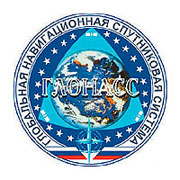
“Glonass will be used extensively in the future to control spacecraft,” said Sergei Berezhnoi, an aide to the head of the Titov Space Control Center, Russia’s main satellite control center.
According to the official, the Glonass system will also render automated assistance in the search for “missing” satellites with which operators on the ground have lost contact.
“In addition, this system could be used to help fix satellite glitches without the involvement of ground control facilities,” he added.
Glonass (Global Navigation Satellite System), which was officially launched in 1993, is Russia’s answer to the US Global Positioning System (GPS). It provides real-time positioning and speed data for surface, sea and airborne objects with an accuracy of one meter.
The Glonass system requires at least 18 operational satellites for continuous navigation services across the entire territory of Russia and 24 satellites to provide navigation services worldwide.
A group of 29 Glonass satellites is currently in orbit: 24 are currently in operation, three are spares, one is in maintenance, and one is in test flight phase, according to Russia’s space agency, Roscosmos.
By 2020, Russia plans to have 30 Glonass-M and new-generation Glonass-K satellites in orbit, including six in reserve, Roscosmos has said.
Russian President Vladimir Putin called on the members of the Commonwealth of Independent States (CIS) to join Glonass.
“This system has the capability to provide considerable benefits in the economic sphere, since it reduces cargo transportation costs on all transportation systems, and it definitely increases the safety of all types of transportation,” Putin said at a session of leaders of CIS member states in December 2012.
From Ria Novosti
“As you know, the Kaliningrad region is isolated, geographically isolated, so we could apply some measures also to cut something,” said Linas Linkevicius, Lithuanian Foreign Minister. “Transport, we could cut off trains, but not only trains, also the supply of goods, whatever. It is theoretically possible,” the official added. 
Journalists raised the topic as Lithuania, which currently holds the rotating presidency in the EU, is preparing to host the Third Eastern Partnership Summit– the major conference dedicated to strengthening trade ties between the European economic bloc and six states in Eastern Europe and the Caucasus – Armenia, Azerbaijan, Belarus, Georgia, Moldova and Ukraine. All of these countries are Russian neighbors and close economic partners.
Russia is currently building its own economic bloc – the Customs Union – which currently consists of itself, Belarus and Kazakhstan, but to which it welcomes other neighboring nations.
Brussels is locked in an increasingly tense standoff with Moscow over its Eastern Partnership policy, which is designed to draw six countries — Ukraine, Belarus, Moldova, Georgia, Azerbaijan and Armenia — more closely into the European fold.
At the Vilnius summit on Nov. 28 to 29, the EU is expected to sign a free trade deal with Ukraine and take further steps towards free trade agreements with Moldova and Georgia. No substantial progress is expected with the other partnership states, which remain more closely aligned with the Kremlin.
Москва – не Россия.
25 Sep 2013 Москва поднимается все выше в рейтинге самых богатых и шикарных городов планеты, утверждает ABC. По числу мультимиллионеров – первое место в мире, по количеству автомобилей (4 млн на 12 млн жителей) – первое место среди европейских столиц, приводит статистику журналист Рафаэль М.Манюэко. 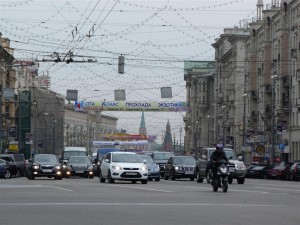
Санкт-Петербург сильно отстает от Москвы, а ее отличия от других крупных российских городов, по мнению автора, “практически непреодолимы”. Корреспондент разъясняет: в Москве сосредоточено 8,5% населения России и более 80% финансовых ресурсов. “Почти все деньги от продажи сырья оседают в столице”.
Круглосуточные магазины и рестораны, экзотические продукты, динамичная и гламурная ночная жизнь, доступ к wi-fi в кафе, метро и парках. “Изобилие дорожек для велосипедистов или конькобежцев, особенно в парках”, – утверждает автор.
По мнению испанского журналиста, сегодня Москва великолепна как никогда в своей истории. “Москвичи гордятся превращением города в грандиозную витрину, хотя это ничуть не отражает реальную жизнь в остальной стране”, – говорится в статье.
Впрочем, Манюэко перечисляет и минусы: транспортные пробки, загрязнение окружающей среды. “Это один из самых дорогих городов мира, притом что средний уровень доходов сильно отстает от показателей ЕС”, – пишет автор. Дорожные работы проводятся весь год, и “это важный источник дохода для коррумпированных чиновников”, добавляет автор.
Не хватает небольших магазинов: всюду только супермаркеты и бутики. Общественный транспорт, за исключением метро, не отвечает запросам огромного города. Все эти недостатки обещал исправить кандидат в мэры Алексей Навальный, но большинство москвичей проголосовало за Собянина, сообщает своим читателям Манюэко.
Статья – Рафаэль М.Манюэко Инопресса – Artículo original – Rafael M. Mañueco Moscù no es Rusia ABC 24.09.2013
Смотри
Gabriel García Márquez. Moscú 1957, “la aldea más grande del mundo”. Daniel Utrilla, El Mundo
Grandi manifestazioni sul Don per il 20esimo anniversario della costruzione dell’Asilo a Rossosch, Voronezhskaja oblast (circa 750 chilometri a sud da Mosca). Quasi un migliaio di alpini con le loro famiglie sono giunti in queste terre lontane per celebrare la ricorrenza.
Come si ricorderà, la struttura fu costruita sul luogo, dove sorgeva il Comando alpino durante la Seconda guerra mondiale. Subito dopo la caduta del Muro di Berlino gli italiani sono tornati quaggiù, dove migliaia di connazionali riposano in pace.
La costruzione dell’Asilo, al cui interno si trova il Museo del Medio Don – diretto dal prof. Alim Morozov, è stato l’ulteriore dimostrazione della riappacificazione tra i due popoli divisi dalla tragedia della guerra voluta dagli opposti totalitarismi.
Il centro dei festeggiamenti è l’Asilo. E’ previsto anche un concerto in piazza Lenin, con la partecipazione di un coro degli alpini ed artisti locali. Gli ospiti italiani hanno visitato venerdì le rive del Don distanti alcune decine di chilometri ad est da Rossosch e domenica Nikolajewka (oggi Livenka), circa 150 chilometri ad ovest del capoluogo provinciale.
Giuseppe D’Amato
Kashagan, first oil volumes produced.
11 Sep 2013 The North Caspian Operating Company (NCOC) has reported the first oil has been extracted from Kazakhstan’s massive offshore Kashagan field.
The Kashagan field in the Caspian Sea has an estimated 4.8 billion tons of oil reserves as well as natural gas. 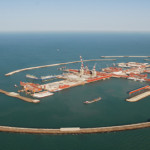
Production at the site is years behind schedule.
Partners in the NCOC are KazMunaiGaz, Italy’s Eni, France’s Total, the Anglo-Dutch company Royal Dutch Shell, the U.S. company ExxonMobil, and Japan’s Inpex.
Kazakhstan recently used its preemptive right to purchase a 8.45 percent share from ConocoPhillips and reports indicate Kazakh authorities will sell that stake to the China National Petroleum Corporation.
Welcome
We are a group of long experienced European journalists and intellectuals interested in international politics and culture. We would like to exchange our opinion on new Europe and Russia.
Categories
- Breaking News (11)
- CIS (129)
- Climate (2)
- Energy&Economy (115)
- EU Eastern Dimension (85)
- Euro 2012 – Sochi 2014 – World Cup 2018, Sport (43)
- Euro-Integration (135)
- History Culture (198)
- International Policy (261)
- Military (74)
- Interviews (18)
- Italy – Italia – Suisse (47)
- Odd Enough (10)
- Poland and Baltic States (126)
- Religion (31)
- Russia (421)
- Survey (4)
- Turning points (4)
- Ukraine (176)
- Российские страницы (113)
Archives
- November 2020
- October 2020
- September 2020
- August 2020
- July 2020
- May 2020
- April 2020
- March 2020
- January 2020
- December 2019
- November 2019
- October 2019
- September 2019
- August 2019
- July 2019
- June 2019
- May 2019
- April 2019
- March 2019
- February 2019
- December 2018
- November 2018
- October 2018
- September 2018
- August 2018
- July 2018
- June 2018
- May 2018
- April 2018
- March 2018
- February 2018
- January 2018
- December 2017
- November 2017
- October 2017
- September 2017
- August 2017
- July 2017
- May 2017
- March 2017
- January 2017
- December 2016
- November 2016
- October 2016
- September 2016
- July 2016
- June 2016
- May 2016
- April 2016
- February 2016
- January 2016
- November 2015
- October 2015
- September 2015
- June 2015
- April 2015
- March 2015
- February 2015
- January 2015
- December 2014
- November 2014
- October 2014
- September 2014
- August 2014
- July 2014
- June 2014
- May 2014
- April 2014
- March 2014
- February 2014
- January 2014
- December 2013
- November 2013
- October 2013
- September 2013
- August 2013
- July 2013
- June 2013
- May 2013
- April 2013
- March 2013
- February 2013
- January 2013
- December 2012
- November 2012
- October 2012
- September 2012
- August 2012
- July 2012
- June 2012
- May 2012
- April 2012
- March 2012
- February 2012
- January 2012
- December 2011
- November 2011
- October 2011
- September 2011
- August 2011
- July 2011
- June 2011
- May 2011
- April 2011
- March 2011
- February 2011
- January 2011
- December 2010
- November 2010
- October 2010
- September 2010
- August 2010
- July 2010
- June 2010
- May 2010
- April 2010
- March 2010
- February 2010
- January 2010
- December 2009
- November 2009
- October 2009
- September 2009
- August 2009
Our books





